Time Jumping TV, aka, the Most Annoying TV Trope of 2009
Whenever I screen Luis Buñuel’s Un Chien Andalou (1929) for students one aspect of the film that we invariably discuss (in addition to the infamous eye-slicing scene), is the way that the filmmaker plays with time. The film opens with an intertitle “Once upon a time” and is followed with such erratic markers of time as “eight years later,” “around three in the morning,” “sixteen years earlier” and finally, the cryptic “in spring.”
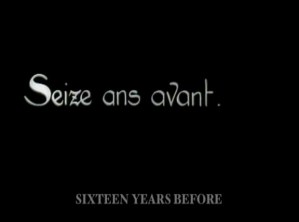
I enjoy Un Chien Andalou‘s defiance of temporality because it makes sense in the context of a Surrealist film; Surrealism aims to disturb the viewer through the irrational pairing of images — ants crawl out of a hole in a man’s palm, an androgynous young woman pokes a severed hand with a stick, etc. The film’s temporal disjunctures further add to the viewer’s unease — we cannot orient ourselves in time and are therefore wholly at the whim of the filmmaker. This kind of playing with time is not limited to Surrealist films. Films as diverse as Pulp Fiction (1994, Quentin Tarantino), Run Lola Run (1998, Tom Tykwer) and Memento (2000, Christopher Nolan) jump around in time, as do television shows like Lost. Recently, programs like One Tree Hill and Desperate Housewives decided to shift their narratives to four and five years in the future, respectively, a bold move which ultimately revived the lackluster storylines of both programs.

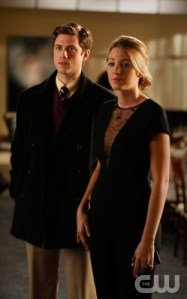
It’s not that I don’t enjoy this narrative structure (even when it’s overused). I just hate when writers use this trope to make an otherwise uninteresting story appear more interesting. To show you what I mean, let’s look at two recent examples of narrative time-jumping, one that worked and one that failed.
The One that Worked: Modern Family‘ s “Fizbo”
“Fizbo” opens with various members of the Pritchett clan pacing anxiously around a hospital waiting room. Mitchell (Jesse Tyler Ferguson) refers cryptically to an “accident” while Jay (Ed O’Neill) wonders how it might have been averted. Their faces are grave. At this point in the show the viewer is in the dark about who has been injured, how s/he has been injured and how serious the injury is. The show then jumps back in time to reveal Phil’s (Ty Burrell) decision to host an elaborate birthday part for his son, Luke (Nolan Gould).

This use of time jumping is effective in “Fizbo” because the viewer is given double duties. First, we are watching the episode’s narrative — about Luke’s over the top birthday party (a moon bounce! a reptile lady! a clown!) — unfold. But we are also searching for the cause of the horrible accident. As a result, every new element introduced to the story becomes a suspect: Jay gives Luke a crossbow as a present, a zipline running through the middle of the party seems destined to cause a concussion for some unlucky child, and one of the reptile lady’s poisonous scorpions is set loose by a jealous Haley (Sarah Hyland). Without the time jumping narrative structure the series of bizarre events occurring at Luke’s birthday party would be just that — bizarre. But knowing that one of these dangers will be the cause of the hospital visit we witnessed at the beginning of the episode serves to tie these disparate elements together. In fact, the more bizarre the element (i.e., the crossbow), the funnier the episode becomes.
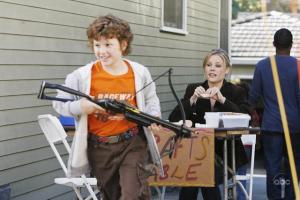
We eventually learn that Luke is the one in hospital and that he broke his arm after slipping on some beads from the craft table his mother set up. This is the great punchline of the episode because the craft table was the most banal aspect of the party but ultimately, the most dangerous. I’ll never look at comb sheaths the same way again.
The One that Didn’t Work: Gossip Girl‘s “The Debarted”
“The Debarted” opens with Serena (Blake Lively) and her milquetoast lover, Tripp Vanderbilt (Aaron Tveit), who I like to call Waspy McWasperson, engaged in a lover’s quarrel. The source of their tension is, I presume, supposed to be mysterious to the viewer. But given that the characters on this program fight with each other constantly, making up and breaking up and swapping lovers and eloping and divorcing in a nonstop carousel of terrible plotting, I was not all that intrigued. Then, out of nowhere, three wolves appear in the middle of the road (seriously!) and poor old Waspy swerves to avoid hitting them (animal lover that he is) and his Range Rover plows into a guard rail. Nooooo! Despite my lack of interest in why Serena and Congressman McWasperson were fighting and who was hurt, the episode jumped back to “eight hours earlier” to explain the whole mess.
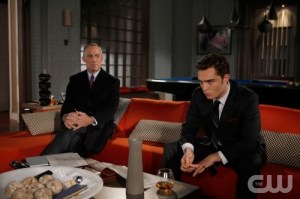
The reason “The Debarted”‘s use of time jumping fails is that it is entirely arbitrary. The big event that the episode is supposed to lead up to — the car crash — only involves two characters and so, when the time jump occurs, all of the other character’s storylines remain unaffected. Knowing why Serena and Waspy were fighting has little bearing on the far more compelling storyline involving Chuck (Ed Westwick) and his inability to mourn his father (the Bart referenced in the episode’s title) on the one year anniversary of his death. Eventually Chuck ends up at the hospital to see Serena, which leads him to finally break down and cry, but the episode needn’t have opened with the car crash in order to bring about Chuck’s change of heart. The episode also focuses on a “secret letter” that Lily (Kelly Rutherford) is keeping from Rufus (Matthew Settle) (YAWN!), but the car accident has very little to do with that story. The fact remains that “The Debarted”‘s narrative and its impact on the show’s characters would have remained unchanged if it had moved forward chronologically. Time jumping in this episode is simply a gimmick, a crutch for the show’s lazy writers. In fact, it is my personal opinion that Gossip Girl is penned by two monkeys throwing their poop at a keyboard. But that’s just my opinion.
So what do you think? Are you sick of time jumping TV? What other prgrams are doing this right now? And who is using this tope successfully and who is failing? I would love to hear your comments.
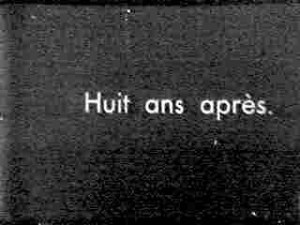
December 11, 2009 at 11:13 am
This makes me think of the backwards episode of Seinfeld: “The Betrayal.” http://en.wikipedia.org/wiki/The_Betrayal
December 11, 2009 at 11:25 am
I don’t remember that episode! Was it a successful use of time jumping?
December 11, 2009 at 11:48 am
Yeah. The entire story was told in reverse chronology, which let them play around with the structuring of the humor. Plus, apparently, it’s an homage to a Harold Pinter play/film, so bonus points there.
December 11, 2009 at 12:39 pm
i don’t watch so much scripted television anymore (except for House), but when i’m with friends i tend to get roped into some shows/conversations about shows…
i suppose it’s not necessarily a 2009-er since it’s been airing a few seasons, but isn’t the show How I Met Your Mother basically founded on this time jump trope? i’ve seen all of 1.5 episodes, so i sincerely don’t know. i’m thinking the difference would be (and i don’t remember the formula for the show), the audience rarely (and maybe never) gets to see the present/future before the past narrative takes hold, but i guess every show keeps the audience engaged working with the idea each week that some guy’s going to end up with some girl who has kids.
not quite the same thing, really, but still, writers toying with chronology in narrative.
i don’t mind non-linear narratives…i guess…no wait, i do. it’s always seemed gimmicky to me. back when every 17-21 year old boy in america was extolling the awesomeness of Fight Club and Memento (oh, wait, that’s still now, add Boondock Saints), i remember first watching these movies and feeling instantly disappointed.
and you know, on a “tangent,” i’m freaking sick of time travel in film. it’s a concept i think that has been exhausted. this is me being snooty. so give me Back to the Future, Bill and Ted’s Excellent Adventure, and Donnie Darko, and you can have the rest.
December 11, 2009 at 5:29 pm
While your argument is (clearly) about time jumping, I’m SO glad you mentioned “the overused mockumentary style of the contemporary comedy verité.” (After posting here, I’m off to read that FlowTV article you cited…) The device was so fresh and appropriately awkward on/for THE OFFICE (as well as ARRESTED DEVELOPMENT), but it doesn’t always work on PARKS AND RECREATION and MODERN FAMILY, does it?
But to quote David Letterman, that’s not why you called. It was time jumping, right?
I’m not generally opposed to nonlinear storytelling on TV–indeed, “Fizbo” as well as the SEINFELD episode mentioned above was fantastic–but those two words TIME TRAVEL almost immediately turn me off. They are associated with science-fiction, fantasy, and the like–genres that don’t interest me in the least. So when LOST decided to introduced time travel into its already way-to-complicated narrative, I almost stopped watching. And that would’ve been a big deal (for me) because I’m a huge fan of the show and its INITIAL use of nonlinear storytelling (flashbacks, flashforwards–not the time travel bit). But I’m sticking with with it; so perhaps I can come back in May (after the show is officially over) and post something more helpful/analytical here re: time jumping. =)
December 11, 2009 at 5:31 pm
Whoops, I meant, “So when LOST decided to INTRODUCE time travel into…”
December 11, 2009 at 6:37 pm
I agree with you that the time jump in “The Debarted” was lame, and overall I thought it was a pretty bad episode. But I feel compelled to defend Gossip Girl. More often than not, it plays with classic literature and film in smart ways (The Age of Innocence, All About Eve, etc) and while the dialogue may not always be sparkling, the show is a pleasure to watch. It’s gorgeous to look at and uses music extremely effectively to underscore its themes.
December 12, 2009 at 2:27 pm
@KelliMarshall No I don’t think the mockumentary style works that well on newer shows like PARKS AND RECREATION and MODERN FAMILY. I really enjoy both programs but I find the device distracting. I also feel that it serves as a crutch (much like time jumping) for lazy writing. I’d rather have a character show me–through an action, a bit of dialogue, a dirty look–that he is annoyed with another character than have him say to the camera “So and so is really annoying me.” Lazy writing.
And I also enjoy when TV shows and films (and books) play with time, but only if they do so in a creatively useful way. Lately so many programs have been using this device (and I realize it predates LOST) in an uncreative way. Lazy writing.
@Marianne Yes GOSSIP GIRL has fantastic production values. Its cinematography and lush mise en scene are pretty much the only reason I still tune in. But “it plays with classic literature and film in smart ways”? I must respectfully disagree. Every once in a while the show has a clever moment but overall its writing and plotting has been decidely sub-par. It’s a shame too because the cast is great (esp. Ed Westwick and Leighton Meester) and so is the premise–I just feel like they always go for the low hanging fruit.
December 17, 2009 at 2:04 pm
The fabulous wiki TV Tropes calls this device How We Got Here, and there are many examples detailed there. I think its use was popularized by Alias (from its pilot onward), but I remember one of the great examples is in the season 1 finale of The West Wing. The key is that it has to, like with “Fizbo,” make you rethink the narrative momentum, not just force tension early to sustain dull exposition.
December 30, 2009 at 12:32 pm
I’m prepared to make a bold overstatement:
“How we got here” works when the structure is either used to demonstrate how easily it might have been otherwise (comedy) or that it could not have been another way despite all efforts (drama, really good comedy). Other uses are lazy.
I’ll mount a defense of time travel more generally when I’m feeling less hazy.